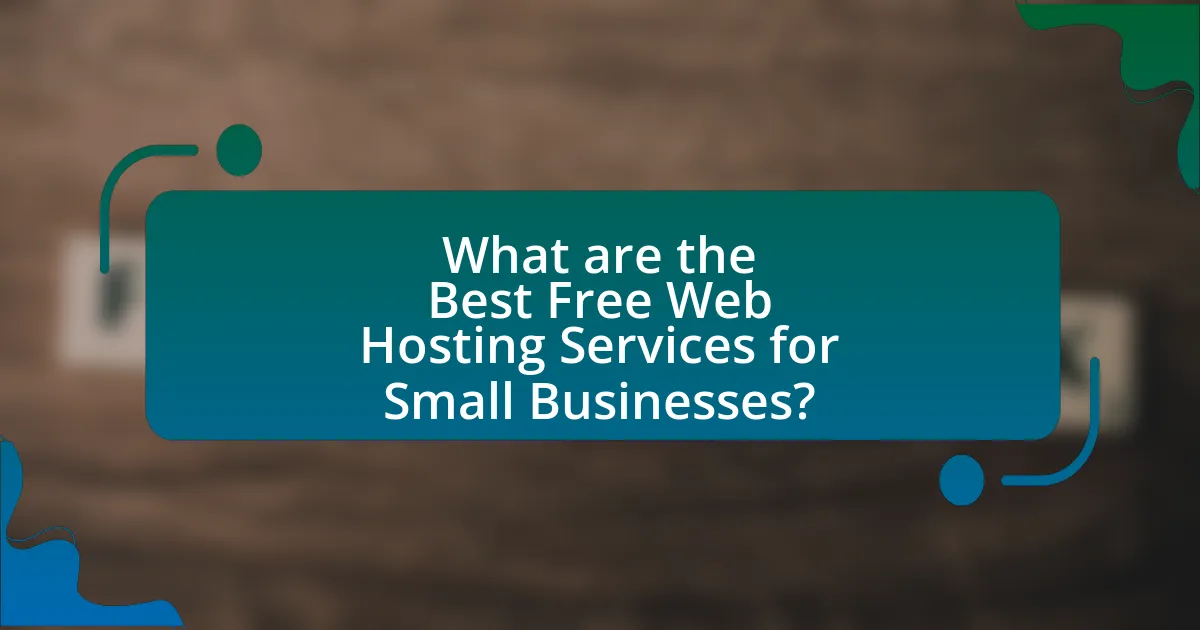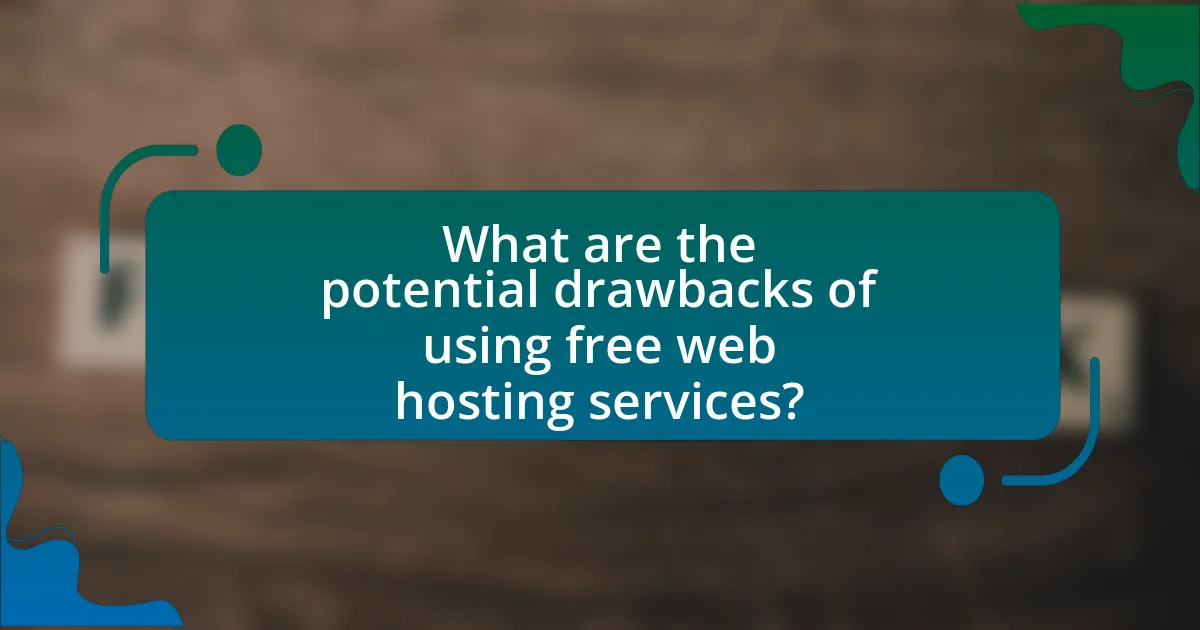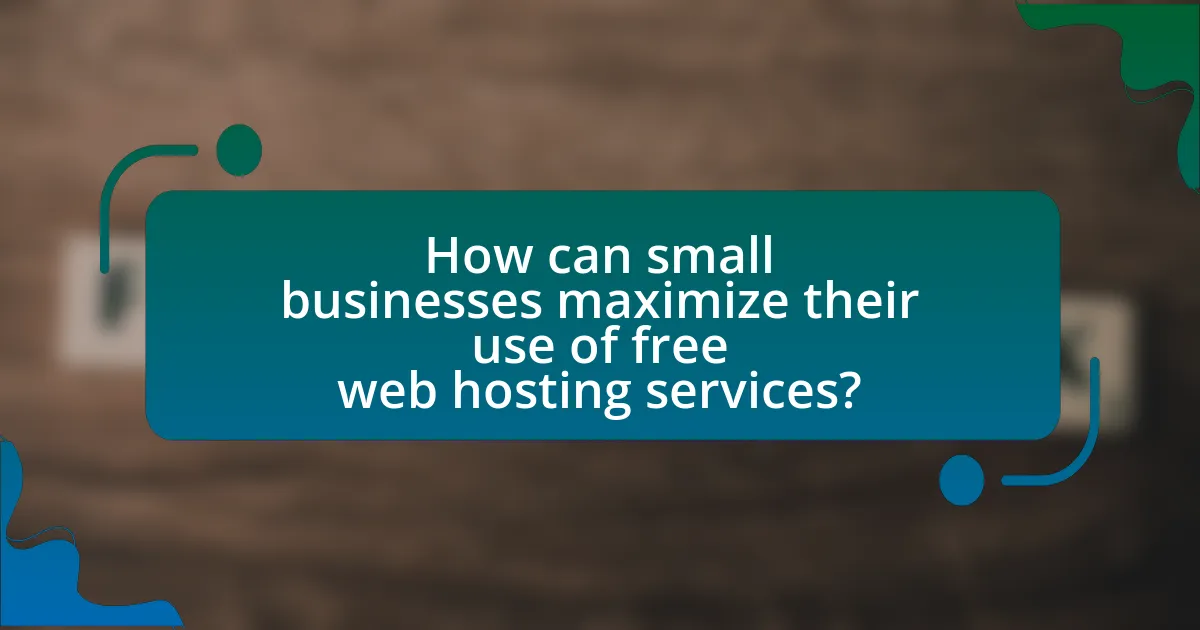The article focuses on the best free web hosting services for small businesses, highlighting options such as InfinityFree, 000webhost, and AwardSpace. It discusses the differences between free and paid hosting services, including limitations like restricted storage, bandwidth caps, and lack of customer support. Additionally, the article outlines the benefits of free hosting for small businesses, such as cost savings and accessibility to essential features, while also addressing potential drawbacks like advertising and security concerns. Key considerations for selecting a free hosting service, optimizing website performance, and enhancing visibility are also covered, providing a comprehensive guide for small business owners looking to establish an online presence.

What are the Best Free Web Hosting Services for Small Businesses?
The best free web hosting services for small businesses include InfinityFree, 000webhost, and AwardSpace. InfinityFree offers unlimited disk space and bandwidth, making it suitable for small business websites. 000webhost provides a user-friendly interface and a free plan with 1 GB of disk space and 10 GB of bandwidth, which is adequate for small projects. AwardSpace features a free hosting plan that includes 1 GB of disk space and a single domain hosting, catering to small business needs. These services are validated by their popularity and user reviews, demonstrating their effectiveness for small business applications.
How do free web hosting services differ from paid options?
Free web hosting services differ from paid options primarily in terms of features, reliability, and support. Free services often come with limited storage, bandwidth, and functionality, while paid hosting typically offers more resources, enhanced performance, and additional features such as custom domain names and email accounts. For instance, a study by HostingAdvice found that paid hosting services generally provide 99.9% uptime guarantees, whereas free hosting may experience frequent downtimes and slower loading speeds. Additionally, paid options usually include customer support, which is often lacking in free services, making it difficult for users to resolve issues efficiently.
What limitations do free web hosting services typically have?
Free web hosting services typically have limitations such as restricted storage space, bandwidth caps, and lack of customer support. These services often provide minimal disk space, usually ranging from 500 MB to 2 GB, which can hinder the ability to host larger websites or applications. Bandwidth limitations can restrict the amount of data transferred, leading to slow loading times or downtime during high traffic periods. Additionally, free hosting often lacks professional customer support, leaving users to troubleshoot issues independently. Furthermore, many free services impose advertisements on hosted sites, which can detract from the user experience and brand image.
How can small businesses benefit from using free web hosting services?
Small businesses can benefit from using free web hosting services by significantly reducing their initial costs associated with establishing an online presence. This cost-saving allows them to allocate resources to other critical areas such as marketing and product development. According to a survey by Clutch, 30% of small businesses reported that budget constraints were a major factor in their decision-making process for web hosting. Additionally, free web hosting services often provide essential features like website builders and templates, enabling small businesses to create professional-looking websites without the need for extensive technical skills. This accessibility can lead to increased visibility and customer engagement, which are vital for growth in competitive markets.
What features should small businesses look for in free web hosting services?
Small businesses should look for reliability, storage capacity, bandwidth, customer support, and ease of use in free web hosting services. Reliability ensures that the website remains accessible, which is crucial for maintaining customer trust. Adequate storage capacity allows businesses to host their content without running into limitations, while sufficient bandwidth ensures that the website can handle traffic without slowdowns. Customer support is essential for resolving issues quickly, and ease of use facilitates website management without requiring extensive technical knowledge. According to a survey by HostingAdvice, 70% of small businesses prioritize uptime and support when selecting a hosting service, highlighting the importance of these features.
What types of storage and bandwidth are necessary for small business websites?
Small business websites typically require at least 1 to 5 GB of storage and a bandwidth of 10 to 50 GB per month. This range accommodates basic website functionalities, including text, images, and some multimedia content. For instance, a website with a few pages and moderate traffic can effectively operate within these limits, ensuring that the site remains accessible without incurring additional costs. According to a survey by HostingAdvice, 70% of small businesses find that 5 GB of storage is sufficient for their needs, while 60% report that 50 GB of bandwidth meets their monthly requirements.
How important is customer support for free web hosting services?
Customer support is crucial for free web hosting services because it directly impacts user experience and service reliability. Users of free web hosting often encounter technical issues or limitations that require assistance, and effective customer support can help resolve these problems quickly. According to a survey by Zendesk, 82% of customers have stopped doing business with a company due to poor customer service, highlighting the importance of responsive support in retaining users. Additionally, free web hosting services typically lack the resources of paid options, making accessible and effective customer support even more vital for user satisfaction and retention.
What are the top free web hosting services available for small businesses?
The top free web hosting services available for small businesses include InfinityFree, 000webhost, and AwardSpace. InfinityFree offers unlimited disk space and bandwidth, making it suitable for small business websites. 000webhost provides a user-friendly interface and a free website builder, which is beneficial for those without technical skills. AwardSpace features a one-click installer for popular CMS platforms, enhancing ease of use for small business owners. These services are recognized for their reliability and features tailored to the needs of small businesses.
What are the key features of WordPress.com for small businesses?
WordPress.com offers several key features for small businesses, including customizable themes, built-in SEO tools, and eCommerce capabilities. Customizable themes allow businesses to create a unique online presence that aligns with their brand identity. Built-in SEO tools help improve visibility on search engines, which is crucial for attracting potential customers. Additionally, eCommerce capabilities enable small businesses to sell products or services directly from their website, facilitating online transactions. These features collectively enhance the functionality and effectiveness of a small business’s online presence.
How does Wix cater to small businesses with its free hosting plan?
Wix caters to small businesses with its free hosting plan by providing an easy-to-use website builder that includes customizable templates and essential features for online presence. This plan allows small businesses to create a professional-looking website without upfront costs, which is crucial for budget-conscious entrepreneurs. Additionally, Wix offers free hosting with no time limits, enabling small businesses to maintain their websites indefinitely without financial pressure. The platform also includes tools for SEO optimization and mobile responsiveness, which are vital for attracting and retaining customers in a competitive market.
What advantages does Weebly offer for small business owners?
Weebly offers several advantages for small business owners, including user-friendly website building tools, integrated e-commerce features, and customizable templates. The platform’s drag-and-drop interface simplifies the website creation process, allowing users without technical skills to build professional-looking sites quickly. Additionally, Weebly provides built-in e-commerce capabilities, enabling small businesses to set up online stores easily, manage inventory, and process payments. According to a 2023 survey by Statista, 30% of small businesses reported that ease of use was a critical factor in their choice of website builder, highlighting Weebly’s effectiveness in meeting this need.

What are the potential drawbacks of using free web hosting services?
The potential drawbacks of using free web hosting services include limited storage and bandwidth, lack of customer support, and the presence of advertisements on hosted sites. Free web hosting often restricts the amount of data and traffic a website can handle, which can hinder performance and growth. Additionally, many free services do not provide reliable customer support, leaving users without assistance during technical issues. Furthermore, these platforms frequently display ads on users’ websites, which can detract from the user experience and diminish the site’s professionalism. According to a study by HostingAdvice, 70% of users reported dissatisfaction with the limitations and ads associated with free hosting services, highlighting these significant drawbacks.
How can limited resources impact a small business website?
Limited resources can significantly hinder a small business website by restricting its functionality, design, and overall performance. For instance, a lack of financial resources may lead to the use of subpar web hosting services, which can result in slower loading times and increased downtime. According to a study by Google, 53% of mobile users abandon sites that take longer than three seconds to load, highlighting the critical nature of website performance. Additionally, limited resources can restrict the ability to invest in professional web design, leading to a less appealing user experience that may deter potential customers. Furthermore, inadequate resources can limit ongoing maintenance and updates, making the website vulnerable to security threats and outdated content, which can negatively impact search engine rankings and user trust.
What are the risks of using a free domain name?
Using a free domain name poses several risks, including lack of control, branding limitations, and potential security vulnerabilities. Free domain names are often tied to the provider’s branding, which can dilute a business’s identity and make it less professional. Additionally, these domains may be subject to sudden changes in terms of service or even removal by the provider, leading to potential loss of online presence. Security risks are also prevalent, as free domains may not offer the same level of protection against cyber threats compared to paid options, leaving sensitive data exposed.
How does advertising affect user experience on free hosting platforms?
Advertising negatively affects user experience on free hosting platforms by introducing intrusive elements that disrupt navigation and content consumption. Users often encounter pop-up ads, banner ads, and video ads that can slow down website loading times and distract from the primary content. Research indicates that 70% of users find ads on free platforms annoying, which can lead to decreased engagement and increased bounce rates. Additionally, the presence of ads can diminish the perceived professionalism of a website, impacting user trust and satisfaction.
What security concerns should small businesses be aware of?
Small businesses should be aware of several security concerns, including data breaches, phishing attacks, and inadequate security measures in web hosting services. Data breaches can lead to the exposure of sensitive customer information, which affects trust and can result in financial loss; for instance, the 2020 Verizon Data Breach Investigations Report indicated that 28% of data breaches involved small businesses. Phishing attacks target employees through deceptive emails, leading to unauthorized access to company accounts. Additionally, many free web hosting services may lack robust security features, making small businesses vulnerable to cyber threats. According to a 2021 study by Cybersecurity Ventures, cybercrime is projected to cost businesses over $10 trillion annually by 2025, emphasizing the importance of addressing these security concerns proactively.
How can small businesses protect their data on free hosting services?
Small businesses can protect their data on free hosting services by implementing strong security measures such as using SSL certificates, regularly updating software, and employing strong passwords. SSL certificates encrypt data transmitted between the website and users, which is crucial for safeguarding sensitive information. Regular software updates address vulnerabilities that could be exploited by attackers, while strong passwords reduce the risk of unauthorized access. According to a report by Verizon, 81% of data breaches are due to weak or stolen passwords, highlighting the importance of this measure. Additionally, businesses should consider backing up their data regularly to mitigate the impact of potential data loss.
What measures can be taken to enhance website security?
To enhance website security, implementing HTTPS is essential, as it encrypts data between the user and the server, protecting sensitive information. Additionally, regularly updating software and plugins mitigates vulnerabilities that could be exploited by attackers. Utilizing strong, unique passwords for all accounts further secures access, while enabling two-factor authentication adds an extra layer of protection. Regular backups ensure data recovery in case of a breach, and employing a web application firewall can help filter out malicious traffic. According to a report by Verizon, 43% of data breaches involve small businesses, highlighting the importance of these security measures.

How can small businesses maximize their use of free web hosting services?
Small businesses can maximize their use of free web hosting services by carefully selecting a platform that aligns with their specific needs and leveraging the available features effectively. Choosing a reputable free hosting provider, such as WordPress.com or Wix, ensures access to essential tools like website builders, templates, and customer support. Additionally, small businesses should optimize their website content for search engines to enhance visibility, utilize social media integration to drive traffic, and regularly update their site to engage visitors. According to a 2021 survey by Clutch, 46% of small businesses reported that having a website improved their credibility, demonstrating the importance of a well-maintained online presence, even on free platforms.
What best practices should small businesses follow when using free hosting?
Small businesses should prioritize reliability, security, and scalability when using free hosting. To ensure reliability, they should choose a provider with minimal downtime and good performance metrics, as consistent access to their website is crucial for customer engagement. For security, businesses must utilize features such as SSL certificates and regular backups, as free hosting often lacks robust security measures, making them vulnerable to data breaches. Scalability is important because as a business grows, it may need to upgrade its hosting plan; therefore, selecting a provider that offers easy migration options is essential. According to a 2021 survey by HostingAdvice, 70% of small businesses reported that website downtime negatively impacted their revenue, highlighting the importance of choosing a dependable hosting service.
How can small businesses optimize their website for performance?
Small businesses can optimize their website for performance by implementing techniques such as compressing images, utilizing browser caching, and minimizing HTTP requests. Compressing images reduces file sizes, which can significantly decrease loading times; for instance, using tools like TinyPNG can reduce image sizes by up to 70% without losing quality. Browser caching allows frequently accessed resources to be stored locally on users’ devices, leading to faster load times on repeat visits. Additionally, minimizing HTTP requests by combining CSS and JavaScript files can reduce the number of requests made to the server, improving overall site speed. According to Google, a one-second delay in mobile load times can reduce conversions by up to 20%, highlighting the importance of these optimizations for small businesses aiming to enhance user experience and drive sales.
What strategies can be employed to enhance website visibility?
To enhance website visibility, businesses should implement search engine optimization (SEO) strategies, utilize social media marketing, and engage in content marketing. SEO involves optimizing website content and structure to improve rankings on search engines, which can lead to increased organic traffic. According to a study by HubSpot, 61% of marketers say improving SEO and growing their organic presence is their top inbound marketing priority. Social media marketing allows businesses to reach a broader audience by sharing content and engaging with users on platforms like Facebook, Instagram, and Twitter. Research from Sprout Social indicates that 54% of social browsers use social media to research products. Content marketing, which includes creating valuable and relevant content, helps attract and retain a clearly defined audience, ultimately driving profitable customer action. A report by the Content Marketing Institute shows that content marketing generates over three times as many leads as traditional outbound marketing.
What common troubleshooting tips can help small businesses with free hosting?
Common troubleshooting tips for small businesses using free hosting include checking server status, ensuring domain name settings are correct, and reviewing website error messages. Server status can be verified through the hosting provider’s status page, which often indicates if there are outages or maintenance. Correct domain name settings are crucial; businesses should confirm that their domain is properly pointed to the hosting server. Additionally, understanding and addressing website error messages, such as 404 or 500 errors, can help identify issues related to broken links or server misconfigurations. These steps can significantly enhance website performance and reliability for small businesses utilizing free hosting services.
How can small businesses resolve common issues with website downtime?
Small businesses can resolve common issues with website downtime by implementing reliable monitoring tools and choosing a robust web hosting service. Monitoring tools, such as UptimeRobot or Pingdom, provide real-time alerts when a website goes down, allowing businesses to respond quickly. Additionally, selecting a web hosting provider known for high uptime rates—typically above 99.9%—ensures that the website remains accessible. For instance, many reputable free web hosting services offer solid uptime guarantees, which can significantly reduce the frequency of downtime incidents. By combining proactive monitoring with a dependable hosting solution, small businesses can effectively minimize the impact of website downtime.
What steps should be taken if a website is running slowly?
To address a slow-running website, first, conduct a performance analysis using tools like Google PageSpeed Insights or GTmetrix to identify specific issues. These tools provide insights into loading times, resource sizes, and optimization suggestions. Next, optimize images by compressing them without losing quality, as large images can significantly slow down loading times. Additionally, minimize HTTP requests by reducing the number of elements on a page, such as scripts and stylesheets. Implement browser caching to store frequently accessed resources locally, which can enhance loading speed for returning visitors. Finally, consider upgrading your hosting plan or switching to a more reliable hosting provider if performance issues persist, as inadequate server resources can lead to slow website performance.


